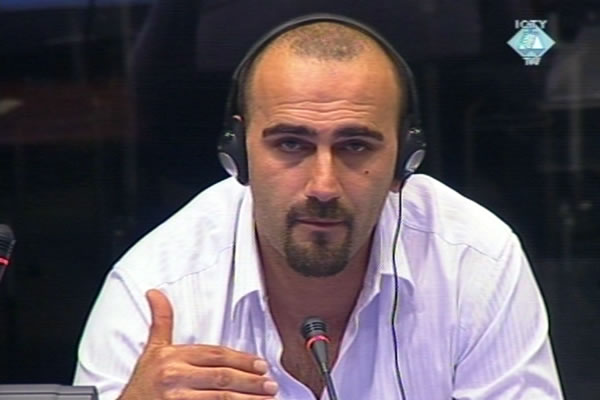Home
WHY WON'T KABASHI TESTIFY AGAINST HARADNAJ AND OTHERS
Today, Kabashi again stubbornly refused to repeat the claims he had made to the OTP investigators and to reply to the prosecutor's questions about the crimes in the KLA camp in Jablanica. However, the former guard in the KLA camp remained unclear about the reasons for his stubborn refusal. He said he 'cannot reply' when the prosecutor asked him if he had any concerns for his safety, and that he “didn't know” if he was concerned for the safety of anyone else. He did clearly say the other witnesses of the crimes in Jablanica had been 'killed or disappeared'
 Shefqet Kabashi, witness at the Haradinaj, Balaj and Lahi Brahimaj trial
Shefqet Kabashi, witness at the Haradinaj, Balaj and Lahi Brahimaj trial ‘Do what you will with me, you can kill me, you can incarcerate me, but I can't testify', said Shefqet Kabashi in court today. He is one of the key prosecution witnesses at the trial of Ramush Haradinaj, Idriz Balaj and Lahi Brahimaj, charged with crimes against Serbs, Albanians and Roma in the Jablanica camp in 1998. Kabashi was brought to court from the UN Detention Unit, where he was taken last week after his arrest. He was charged with contempt of court because in 2007 he twice refused to testify at the first trial of the KLA commanders. The re-trial was ordered by the Appeals Chamber which ruled that the trial had ended prematurely, before the Trial Chamber heard Kabashi and another protect witness. Haradinaj and Balaj were acquitted by the Trial Chamber, and Brahimaj was sentenced to six years in prison.
Shefqet Kabashi spent far more time in court today than he had on the previous two occasions, without saying anything more about the crimes in Jablanica. In his statements to the OTP investigators in 2004 and 2007, Kabashi said that civilians were detained and beaten in the camp, which was under the command of Lahi Brahimaj, while Ramush Haradinaj was in charge of the whole region of Dukagjin. When he testified as a protected witness at the trial of Fatmir Limaj and others, Kabashi said he saw detained Kosovo Albanians Skender Kuqi and Pal Krasniqi in Jablanica. Both were later killed. Today he claimed he couldn't recall any of it.
Whenever Kabashi was asked any questions about the crimes in Jablanica, he changed topic and criticized the Tribunal. He complained about his arrest and about the fact that he was put in a cell next to war criminals, where he 'saw Radovan Karadzic play tennis'. He asked prosecutor Rogers how he could trust him, knowing that those who committed crimes in Kosovo walked free, and the witnesses who spoke about their crimes had been 'killed or disappeared'. 'Fortunately, I'm still alive', Kabashi said, obviously determined to keep it that way.
The unwilling witness gave as good as he got in an exchange with Haradinaj s defense counsel Emmerson and the many members of the defense teams representing the former KLA commanders. As he said, he didn't want to respond to their questions because they were all the same; 'today you represent the defense, tomorrow, you'll represent the prosecution', he said, adding that they were 'interested only in the millions' they have received. Those millions could have been better spent to help the homeless, the disabled and the victims' families in Kosovo, Kabashi said. At one point, he even told the judges to leave him alone.
In an effort to articulate Kabashi s views, his defense counsel Michael Karnavas, who is representing him in the contempt of court case, said his client felt 'betrayed' because he 'spoke out when no one else dared to speak' and he cooperated with the prosecution which has not done a proper job bringing those responsible for the crimes in Kosovo to justice.
When he was asked if he had any concerns for his safety, Kabashi asked a counter-question. 'Do I look like a man who is concerned?' When the prosecutor repeated the question, the witness looked down, took a deep breath and said, 'I can't answer that'. He also evaded answering the question about any safety concerns for persons close to him, saying he didn't know what to say.
As the prosecutor then said, 'things have come to a point where further steps must be considered' in the effort to hear the witnesses. Kabashi was led out of the courtroom and the court went into closed session. At the end of the hearing, the prosecution indicated it would present its decision tomorrow morning. One of the mechanisms at the prosecution's disposal exists in Rule 92 quinquies; it allows admission into evidence of previous statements made by witnesses who refuse to testify in court because they have been tampered with. This includes 'threats, intimidation, causing harm, bribe or duress'.
If the prosecution opts for this move, it will be up to the Chamber to decide if Kabashi's previous statements and his testimony in the Limaj et al. case will be admitted into evidence. It is quite certain now that the contempt of court indictment against Kabashi will not be withdrawn and that he will be back in court on Friday to enter his plea on the charges.
Linked Reports
- Case : Haradinaj et al.
- 2011-08-19 SHEFQET KABASHI’S EVIDENCE POSTPONED FOR MONDAY
- 2011-08-18 PROSECUTION CONVINCED RAMUSH HARADINAJ IS GUILTY, DEFENSE CLAIMS HE IS INNOCENT
- 2011-08-17 NEW TRIAL OF HARADINAJ, BALAJ AND BRAHIMAJ OPENS TOMORROW
- 2011-08-23 FIGHT TO ADMIT KABASHI'S PREVIOUS TESTIMONY
- 2011-08-24 TRANSCRIPT OF TESTIMONY ABOUT JABLANICA CRIMES ADMITTED INTO EVIDENCE AT HARADINAJ ET AL. TRIAL
- 2011-08-25 BLACKMAIL USED TO OBTAIN INTELLIGENCE ON KLA
